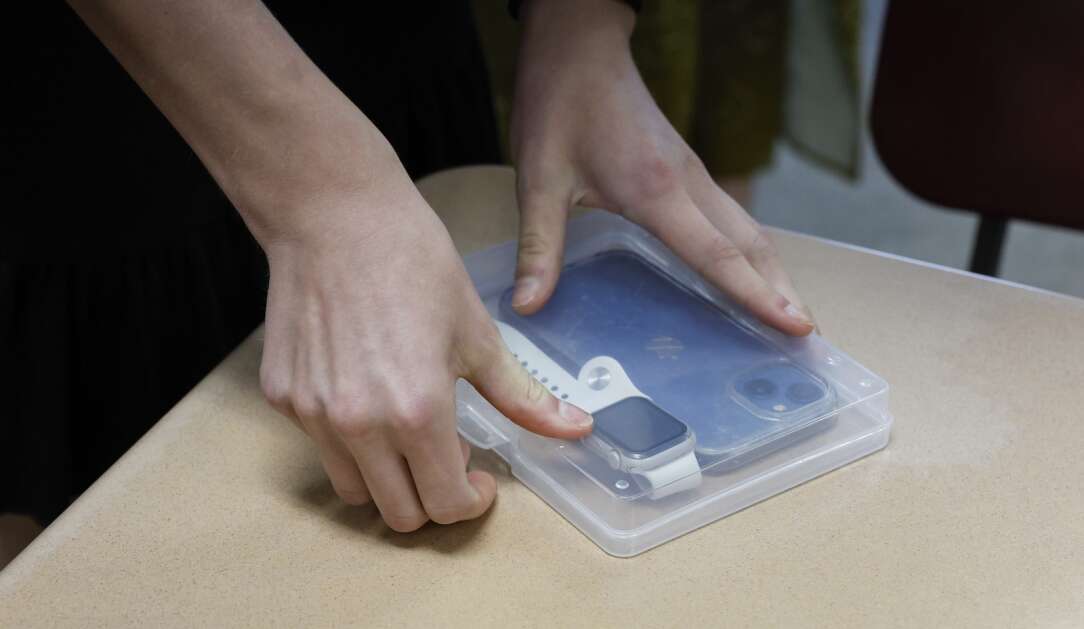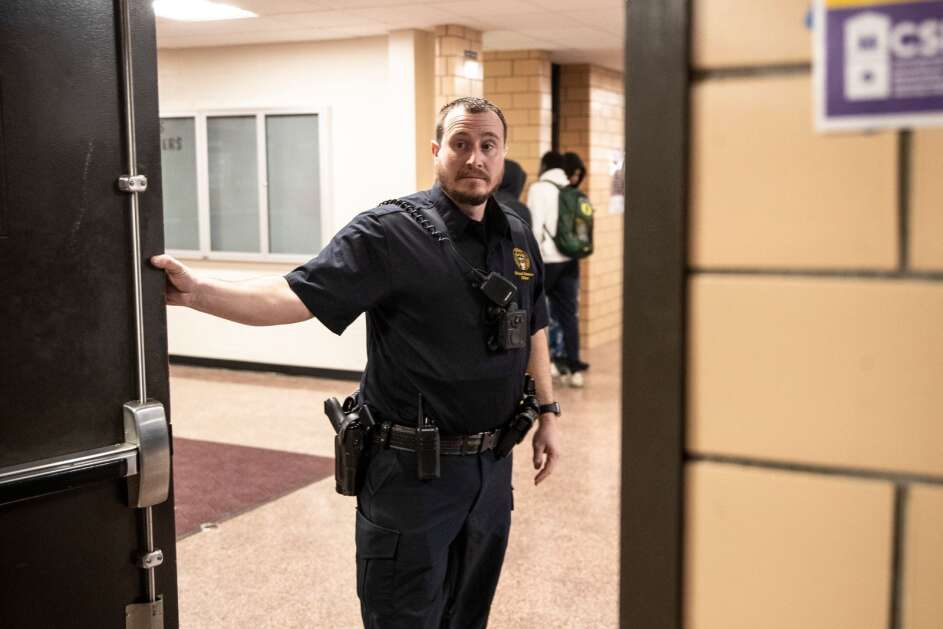The Gazette offers audio versions of articles using Instaread. Some words may be mispronounced.
Iowa students will be more engaged in their learning and with their peers as they head back to school this fall under new policies restricting the use of cellphones and other personal electronic devices during the school day, educators say.
New policies are being approved by Eastern Iowa school boards that prohibit students from using cellphones during class time. The policies align with
House File 782
, which passed the Iowa Legislature with near-unanimous support and was
signed into law in April by Iowa Gov. Kim Reynolds
. The law applies to public, private and charter schools.
Cedar Rapids Taft Middle School Principal Jessiah Gilchrist said the school has had a policy in place since 2020 restricting the use of cellphones in school — similar to the one being adopted by the Cedar Rapids Community School District.
The Cedar Rapids school board on Monday approved the first of two readings of a policy restricting student use of personal electronic devices.
“Our policy is very straightforward,” Gilchrist said. “During the school day, cellphones are turned off and put in lockers. It’s so effective.”
Gilchrist said on average about two student cellphones each week are turned in to Taft’s main office to be returned at the end of the school day because of students breaking policy.
“Students don’t want to turn their phone in to the office, so they respect the policy really well,” he said. “Kids aren’t on their cellphones here.”
When cellphones are confiscated, it’s main office administrators’ responsibility to do so, not teachers. “If a student doesn’t comply, the teacher doesn’t have to do anything further than let us know so we can intervene and they can do what they need to be doing, which is teaching,” Gilchrist said.
Under the new state law, schools are able to enact policies that help kids focus on learning and engage socially, Gilchrist said.
He said one of his “greatest joys” is seeing students in the cafeteria interacting positively. If cellphones were allowed, he said there’s a higher likelihood students would be head-down with their eyes on a screen.
What does Cedar Rapids’ policy say?
In the Cedar Rapids Community School District, students will not be able to use personal electronic devices — including cellphones, smartwatches, earbuds and headphones — during the school day, according to the proposed policy.
Exceptions include if a building administrator has given a teacher permission to allow students to use their personal electronic devices for a specific instructional purpose or activity.
The second of two readings of the policy will be 5:30 p.m. Aug. 11, at the Educational Leadership and Support Center, 2500 Edgewood Rd. NW, Cedar Rapids.
Families can communicate with a student through the school’s main office for emergency and non-emergency purposes, similar to school board policies across Eastern Iowa.
Jennifer Van Fleet, executive director of student services for the Cedar Rapids district, said she wants to reassure families that schools are committed to getting messages to students from families and vice versa.
“Any caregiver can call our schools and ask the office to get a message to their child. Likewise, a child in our school can say, ‘I really need to get a message to my family,’ and that’s going to happen,“ Van Fleet said.
For a first violation of the policy, a student will surrender their device to school officials for the remainder of the school day.
A second violation of the policy in the same semester will result in the device being surrendered for the remainder of the school day. The students parent or guardian will be notified and the device returned only after the verified parent or guardian has authorized the return of the device.
A third violation of the policy in the same semester will result in the device being surrendered for the remainder of the school day and the device being returned to the student’s parent or guardian.
A fourth violation in a given semester will result in further consequences outlined in the district’s discipline matrix.
“We’re going to focus on education over a punitive approach, working with students and giving them the opportunity to correct that mistake,” Van Fleet said.
Van Fleet said as students learn the new expectations, some might need a “supportive approach.” That could include a plan to have a student leave their phone in the office at the start of the school day, she said.
School districts’ policies similar
The policies created by Iowa school districts are similar and based on a two-page sample policy created by
the Iowa Department of Education
. Some schools adopted policies that are less restrictive than others by allowing high school students to use personal electronic devices during passing time, lunch and before and after school.
The use of district-provided devices — including tablets and laptops — is allowed for instructional purposes.
The legislation was
one of Reynolds’ priorities this year
. She argued it will decrease cyberbullying and classroom distractions, improve students’ concentration and address concerns about students’ mental health.
Reynolds’ bill requires policies create a way for parents or guardians to contact their child during school hours, at a school-sponsored activity, and in an emergency. It also requires schools to develop protocols to “securely store a student’s personal electronic device when such device is in possession of the school district.“
Parents or guardians can petition a school district to allow the student to maintain access to their cellphone during the school day, if they can “establish that there is a legitimate reason related to the student’s physical or mental health.”
English language learners and students with a documented disability or special education needs, as outlined in their Individualized Education Program, would be allowed to use personal electronic devices when necessary to manage their disability effectively or access specialized instruction or supports.
Trial run leads to changes for Solon policy
The Solon Community School District did a trial run of its policy in May.
The district gathered feedback after the trial run, which led to the school board allowing the use of personal electronic devices by students in grades 9-12 during their lunch period, Superintendent Davis Eidahl said.
Eidahl said the district found high school students rely on their cellphones for their calendar, keeping track of athletic practices and communicating with after-school jobs.
Eidahl said they didn’t want juniors and seniors leaving school during their lunch period — which is allowed in the district’s open lunch policy — just to use their cellphones.
Solon students in grades preschool through eighth are not allowed the use of personal electronic devices during the school day. High school students are allowed the use of personal laptops for instructional purposes during the school day, but they cannot be connected to any messaging, social media or non-instructional applications, according to the policy.
Eidahl said legislating restricted use of personal electronic devices in schools was “great timing” for the district, which had been considering implementing a policy for a couple years.
“One of the incentives to restricting cellphone use is to get kids back to interacting and doing other things beside scrolling social media,” Eidahl said.
More districts adopt policies
Linn-Mar, College Community, Mount Vernon and Clear Creek Amana school districts also recently adopted policies that align with the new law.
Discipline for violation of the policy ranges from a documented student warning and the student securing their device out of site on first offense, to further discipline outlined in each school’s discipline policies.
In the Linn-Mar district, students in grades kindergarten through fourth must store their personal electronic devices in their lockers or backpacks. Students in grades five through 12 must store their devices out of sight at all times.
In addition to adopting a policy restricting the use of personal electronic devices by students, the College Community district is promoting Smart Social, a platform designed to educate families to help ensure their children’s safety online.
Families in the College Community district can
register for a free Smart Social account
where they can access information on a number of topics related to technology and school-age children.
Iowa City schools reports increased engagement
In April, the Iowa City Community School District reported its policy
restricting the use of personal electronic devices by students was effective
.
In December, the Iowa City school board approved a cellphone policy that requires phones, earbuds and headphones to be “detached from the student’s body” during instructional time.
Through nine weeks of data collection, presented to the board this spring, violations of the policy trended downward each week. Of the approximately 8,000 students in secondary schools across the district, a little over 1,000 students had had one violation, while 282 had two violations and 100 students had three violations, according to district data. About 55 students across the district had more than three violations.
“We know that for some more than others, this was a change in their practice on a given day,” said Lucas Ptacek, executive director of secondary schools for the Iowa City district.
Comments: (319) 398-8411; [email protected]






